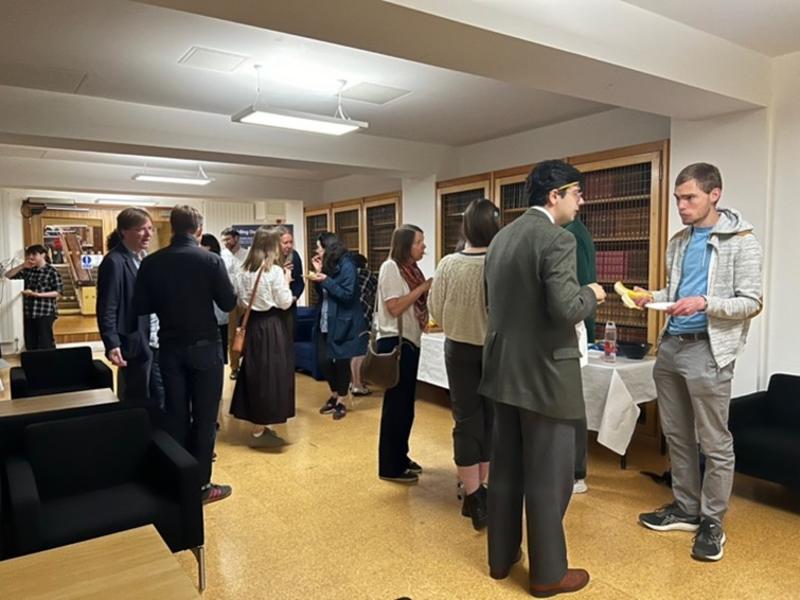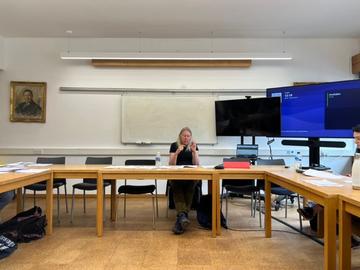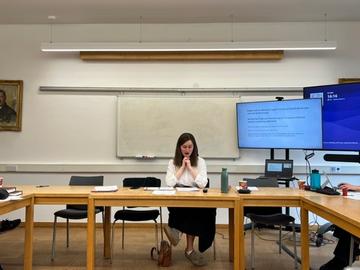Old English Prose Training Day

25 postgraduate students and early career researchers with varying degrees of previous engagement with Old English prose met at the Faculty of English, University of Oxford, on 15th May 2025 to learn more about developments in the field from prominent experts. Each of the experts offered a brief introduction to the corpus at hand, alongside some of the most pressing issues associated with the topic, giving the attendees a fascinating overview of a field with which many only had a passing acquaintance. The prose training day covered three major areas of study: Mercian prose, the Old English Boethius, and Alfredian Prologues and Epilogues. The attendees had been asked to do some preparatory reading of various passages prior to their attendance at the workshop which led to fruitful discussions and lively engagement between experts and attendees and an overall enjoyable and inclusive atmosphere.

Language, translation practices and scribal intentions became the theme of the first session of the day: ‘Mercian Prose: From Study Aid to Creative Writing’, led by Christine Rauer (University of St Andrews). This session covered a wide variety of Mercian literature, from glosses and glossaries, to martyrologies and biblical commentaries. During the initial part of our discussion, we covered translation theory, focusing particularly on Venuti’s literal (foreignizing) and creative (domesticating) translations and the various positive and negative aspects regarding each approach. One of the most fascinating aspects of that initial discussion was how these concepts are applied both to modern editions of Old English text and to the translation practices of the Mercian scribes themselves through inter-linear and in-text glosses. We ended up comparing John Porter’s literal word-by-word translation of Beowulf (Pinner, 1991) to the Vespasian Psalter gloss (Psalm 108) given their similar lay-out and purpose of language and/or classroom learning. We came to the decision that reading the literal (or foreignizing) translation of Beowulf worked as a defamiliarization exercise or an act of ‘abusive translation’, a translation strategy that intentionally deviates from the source text to create a new, often unsettling or challenging, reading experience in the target language, thus emphasising the foreign nature of Old English verse. However, like the glosses, the Porter-translation emulates the reading experience of the medieval English reader, and acts like a crib in the same way as the glosses would have assisted a new learner of Latin. Second, we turned to the use of Latin terminology in Old English prose, primarily the Old English Martyrology, and what their uses might be in the text. Thirdly, we considered the nature of scribal errors and discussed possible excuses for the presence of errors in manuscripts, including bad source texts (such as minim problems, wrong declension endings, or the lack of word spacing), a scribe in a hurry, or simply convoluted Latin.
The second session, ‘The Old English Boethius and Early Medieval Stargazing’ was led by Susan Irvine (UCL). This session continued the theme of translation and engaged with the domesticating ‘translating’ and rewriting practice involved in the composition of the Old English Boethius. Prof. Irvine showed how the Versifier probably only engaged with the Old English prose translations and turned those translations back into poetry. It is debatable to what extent he was successful at turning the prose into poetry, as the Versifier often stressed clarity and understanding over poetic complexity (such as Metre 4). However, the Versifier also occasionally expanded upon the prose translation, such as in Metre 2, in which the Versifier inserted a whole didactic passage likening Earth to an egg for easy comprehension of a difficult theoretical concept.

After our lunch break, we returned to the third and final session of the day: ‘Alfredian Prologues and Epilogues’, led by Amy Faulkner (UCL). Dr Faulkner began our discussion by giving us an introduction to what is considered the Alfredian corpus, and the placement of the Alfredian prologues and epilogues (both verse and prose) within that tradition, which was very informative to all those who had not previously studied this corpus at a previous time. During our discussion we ended up examining three of the four major texts: the Old English Pastoral Care, the Old English Boethius, and the Old English Soliloquies. The prologue of the OE Pastoral Care is the best known of the Alfredian prologues, and the text contains both a prose preface, as well as a verse prologue and epilogue. It was intended to be distributed to bishops to encourage learning and the pursuit of wisdom. This purpose is reinforced by the verse preface, in which the patristic writers such as Augustine and Gregory are considered intermediaries of God’s words , and Alfred’s translation project assists in the distribution of such words because hi his sumne ðorfton, / ða ðe Lædenspræce læste cuðon (‘some of them who least knew Latin had need of it’, 15b–16). Meanwhile, the OE Boethius and the OE Soliloquies are both philosophical texts and thus hard to reconcile with the books which are ‘the most necessary for everyone to know”’ The short prose prologue to OE Boethius explains how Alfred would sometimes translate the text word for word and other times andgit of andgite (‘sense for sense’, 2–3), though it is uncertain why the writer writes about Alfred in the past tense, whether Alfred was dead, if he did what they say he did, or whether the writer of the preface is mythologising Alfred’s deeds. The prose preface to the OE Soliloquies is the only prose preface in which there are no references to Alfred or his translation project. Instead, the writer offers an elaborate metaphor regarding gathering wood, building a dwelling, and living a secluded life. Wisdom, gathered from the forest of scripture, is considered worth pursuing as a stepping stone to the next life.
The workshop was a big success, highly beneficial and educational for both attendees and for the experts giving the sessions. The workshop is part of the bigger AHRC funded project “Writing Pre-Conquest England: A History of Old English Prose”, led by Professor Francis Leneghan.
—Anine Englund


